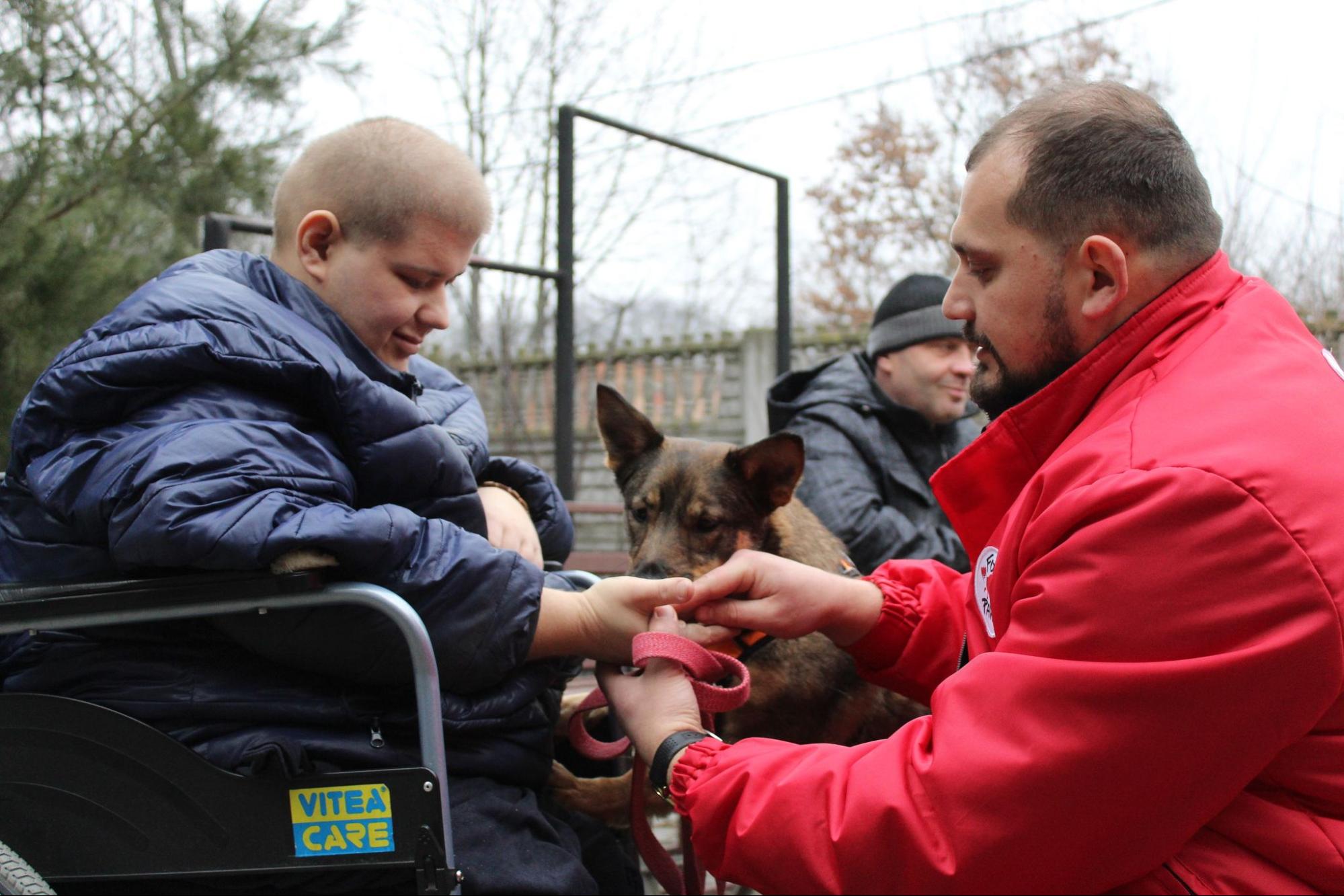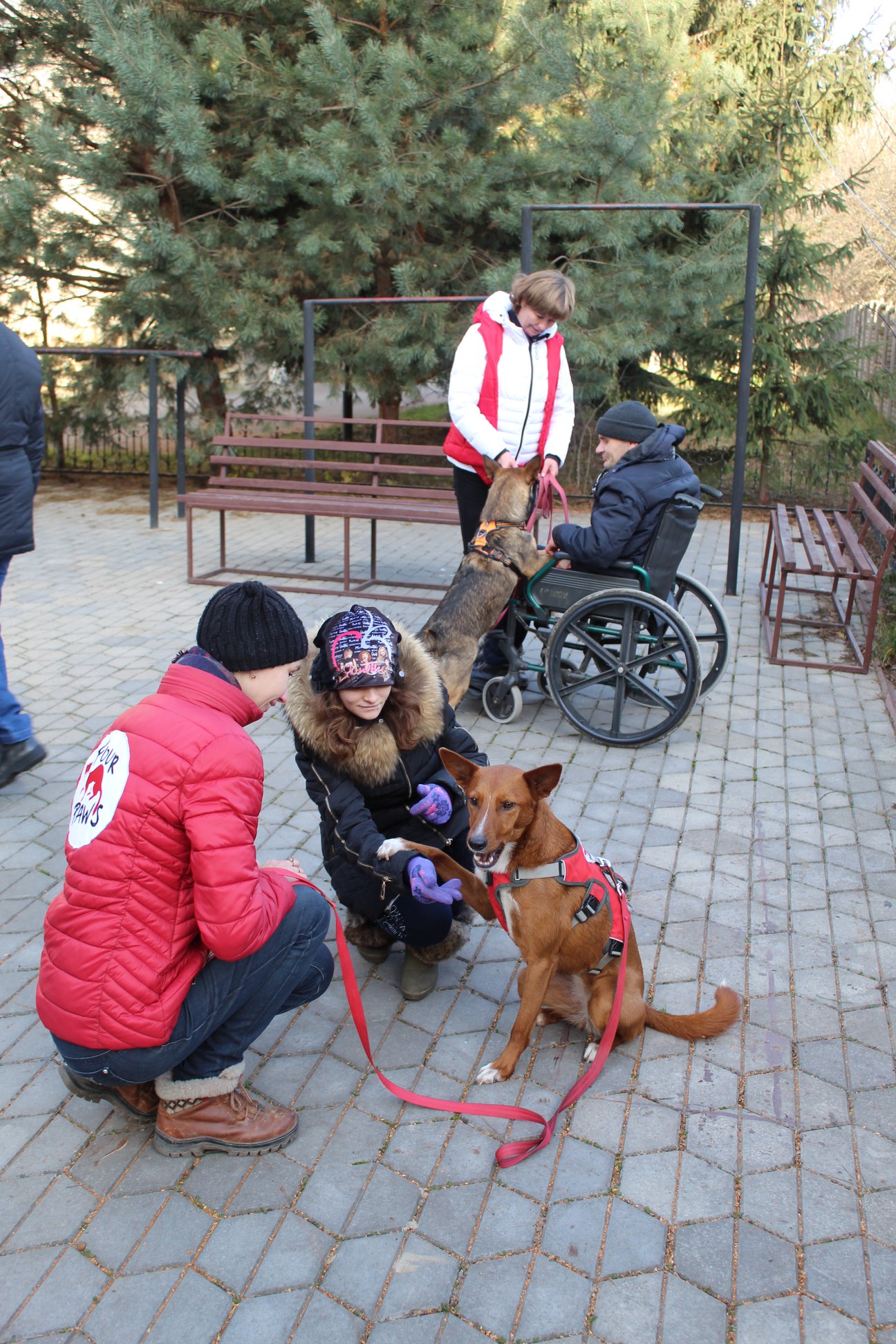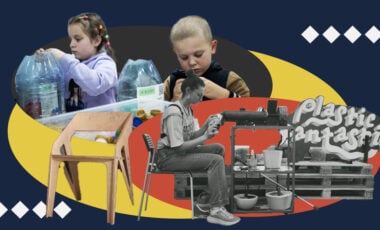Canis therapy for pensioners: how homeless dogs help the elderly in Vinnytsia
Superhero dogs also come to the aid of people with disabilities. We explain how everything works and how it changes the attitude to homeless animals

Canis therapy is a treatment with specially trained dogs; it's used in the West for over 50 years. The idea for animal therapy came from American psychiatrist Boris Levinson, who noticed that his clients responded much better to treatment after talking to his pet, a cheerful and lively dog named Jingle. Levinson's positive experience has been picked up by other psychologists and psychiatrists, and this method of rehabilitation has become extremely popular in many countries. And although in Ukraine the Ministry of Health hasn't officially recognized Canis therapy yet, this alternative method is practiced in our country as well. For the last five years, Ukrainian dog therapists have been successfully working in different parts of our country, receiving words of gratitude and love from young and old patients.
Despite its name, Canis therapy isn't the treatment with dogs, but the use of their partner qualities by a specialist (psychologist, rehabilitation specialist) when working with patients. Patients can be children, adults, the elderly, and the qualities of a dog are fun, calm nature, sociability, patience, and empathy.
Four-legged esculapians help children to overcome insecurity and fears, and adults to fight post-traumatic stress disorder, the elderly, to cope with inattention, loneliness, and stress. Numerous studies have shown that dogs can have a positive effect on the treatment of depression, insomnia, eating disorders, neuroses, recovery from injuries, strokes, other stress disorders, correction of cerebral palsy, Down syndrome, Alzheimer's disease, various types of dementia and autism spectrum disorders (RSD).
Those who have dogs at home know how well pets can calm and relieve stress. You've hugged a tailed family member after a busy day, pet it, played a little, and any problems no longer look so terrible. This type of unconscious Canis therapy is called undirected by experts. Specially trained dogs are used for targeted therapy sessions, and neither the breed nor the appearance of dogs is of particular importance, the key thing is that the "therapist" should be socially oriented, show high emotional sensitivity to people, and quickly adapt to different environments.
In Vinnytsia, with the support of the FOUR PAWS International Charity Foundation, dog therapists help residents of the Vinnytsia Regional Boarding House for the Disabled and the Elderly to overcome the symptoms of the diseases they've encountered. The peculiarity of this project is also that the dogs participating in such visits and activities are former stray dogs that have passed the appropriate selection, training, and testing according to the standards of the foundation.
The team of the Vinnytsia branch of the Four Paws Foundation consists of two dogs, two dog handlers, and a psychologist. Dogs are trained exclusively by the method of positive reinforcement, in which they learn to behave and interact with people through positive experiences and in which there's no place for coercion or punishment.
Dogs for the retired — how did it all start?
Psychologist Ian Petinov, head of the Ukrainian project of Human-Animal Interaction, implemented in Vinnytsia, Ukraine by the Four Paws International Charity Foundation, said that the idea to work in the Vinnytsia Regional Boarding House for the Elderly and People with Disabilities was born in autumn 2019. The foundation developed a project in which the dogs Busia and Lisa, led by a psychologist and guides, worked with children with special needs. "We were invited to cooperate by the staff psychologists of the boarding house. Among the major methods used at the boarding house, our visits with dogs became quite appropriate for the residents. Those who liked to come to the meetings with dogs had the opportunity to show their unconditional positive emotions, pet and treat pawed guests, remember their past pets and pass on to dogs their ability to care, love and kindness even in difficult life circumstances."
In Vinnytsia, there's a Municipal Animal Shelter, where one of the four-legged employees, Lisa, was selected. She was found in 2018 under a bench at a tram stop, where she huddled herself up, hiding from passers-by and the scorching sun. The dog looked starving. Only the delicacies offered to her by the members of the "Four Paws" team could force her to leave the hiding place. Lisa was brought to a local animal shelter for veterinary inspection and behavior monitoring. As soon as her treatment was over and she felt better, it turned out that Lisa could be a great candidate for the Human-Animal Interaction project. Lisa has proven herself as an excellent training dog and has made excellent progress in following the guide's instructions to perform various tasks in working with people, had a contact nature. Another dog, Busia, was sheltered by Four Paws after receiving it from volunteers from Lviv. People-friendly Busia showed the ability to think analytically, was emotionally resilient to various situations, and interesting to communicate. Extremely active and intelligent Lisa and Busia have shown that they can be companion dogs, give joy and enjoy life themselves, and most importantly, they know how and want to love people.
In total, more than 200 people live in the Vinnytsia boarding house. These are elderly people and people with disabilities of I and II groups over 18 years of age, who need outside care and medical care due to their health condition. Some are undergoing planned rehabilitation, others, not having close relatives who could take care of them at home, live in a boarding house forever.
Besides rehabilitation and wellness procedures, the boarding house has interest groups, a park and a sports ground, a library, and museum of ethnography, an assembly hall, and even a functioning Orthodox church. But you can't find pets there, as in many similar institutions; the animals need constant care and strength, which patients often lack.
Meanwhile, the experience of foreign experts shows that dogs and cats have a beneficial effect on people with disabilities and the elderly. So, in the Stuttgart center of mental health Mentalcare, the poodle, Milo has "worked" for some years. "He radiates a sense of security and warmth," said patients at the center. The German Robert Koch Institute also actively supports the therapeutic visits of animals, emphasizing their positive impact on the condition of patients. They noticed that as a result of communication with animals, there's an increase in mental and motor abilities. Residents' of nursing homes and clinic patients' sleep improves; they become less distrustful and inattentive. Besides, the unmet needs of relationships between people can be partially offset by interaction with furry friends, because they can trustingly make a contact, unconditionally accept, and sincerely enjoy each meeting. Psychologists of the Vinnytsia boarding house understood that animal therapy was also necessary for the residents of their institution.
Former homeless dogs, who once needed help from people, came to the aid of the elderly and special people.
Special relationship between human and dog
Practicing psychologist Lesia Makotiak, who worked at the boarding house at the time and was the initiator of inviting therapist dogs to communicate with patients, recalls: "At first, we had to explain why we need the classes on human-animal interaction. Some workers thought it was strange; they treated the initiative with caution, but gradually, understood it after observing the results of meetings. However, not all residents of the boarding house showed interest in this project, but over time, we found persons who were interested in the classes on a regular basis. There were smiles, loud laughter at times. I was amazed at how openly and sincerely people with disabilities and the elderly interacted with dogs without fear, doubt, barriers, and how sincerely they rejoiced with the animals. Watching them, there was an opinion that people and dogs have a special relationship, impossible in such a sense and manifestation between people. This is something special!"
Lesia Makotiak notes that the representatives of the Four Paws Foundation performed their activities professionally, sincerely, with passion and came to the boarding house with positive emotions. Psychologist Yan Petinov and guides Tetiana Murashko and Natalia Sorokina always conducted classes with care for the boarding house residents, performed work with love.
Before quarantine, visits to the boarding house with dogs took place once a week. Each time, Yan and his assistants saw how the residents were waiting for them and how pleased they were with such meetings. There was an incident when a boarding house resident in a wheelchair got into a Canis therapy session and started smiling through tears; his relatives said that they saw the man happy for the first time during the long rehabilitation after a stroke.
"For me personally," says Yan Petinov, "it's an opportunity to provide the needed communication for people who need help in overcoming the feeling of loneliness and are happy with any positive ray in their lives. On our first visit, we came to the boarding house team and left feeling we'd become a big family. I'm convinced that each of us needs to love our life and that of every creature on the planet. And if there's still an opportunity to help someone and change someone's life for the better, don't procrastinate.
As a specialist, it's very important for me to create such meetings and study their impact on the psycho-emotional state of people in special situations, to bring my professional service to society to perfection in the future. Finally, our team seeks to show with our example that stray dogs can be adopted, trained, and become faithful companions or friends for people. Similar projects are implemented by the FOUR PAWS charity foundation in Romania and Bulgaria."
What now, in quarantine?
Unfortunately, the visits of dog-eared therapists were stopped due to quarantine restrictions; the boarding house residents are at high risk. But the team of the Four Paws Foundation is looking forward to the opportunity to resume their work, and Lisa and Busia are always ready for new meetings. After all, the project's goal is to give joy to people in public boarding houses, although it's difficult to get there with dogs for several bureaucratic reasons, including the lack of legislation governing the method of Canis therapy or human-animal interaction as part of socio-psychological support of people with special needs. Abroad, such projects are allowed and regulated by government agencies for the benefit of society. "We hope," says Yan, "that someday there'll be fewer obstacles to goodness in Ukraine."
Now the dogs live with their guides and will stay with them after retirement. But retirement is still far away. So far, Busia and Lisa are improving their skills, meeting with children, communicating with young journalists.
In the classes of the Four Paws Foundation, children are told how to help homeless animals, how to behave with them, how to distinguish non-verbal signals from dogs. The presence of Lisa and Busia, participants of the "Human-Animal Interaction" project, makes these events even more interesting. After all, by their striking example, Lisa and Busia show that the life of any homeless dog can be filled with meaning.
"Changing the attitude of people to homeless animals is our priority," the foundation stresses. "Through our activities, we try to instill a love for four-legged friends from childhood. The "Human-Animal Interaction" project of LLC "Four Paws Ukraine" will continue its activities aimed at psychological assistance to people and changing the attitude to homeless paws because they also deserve respect and high quality of life."
Rubryka also reported how, in Kherson, the library introduced Canis therapy, and a dog therapist is engaged in reading with children.
































































